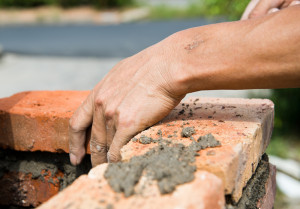“For in Scripture it says: ‘See, I lay a stone in Zion, a chosen and precious cornerstone, and the one who trusts in him will never be put to shame.’” – 1 Peter 2:6
The most important part of any process is laying the foundation. It is upon this foundation that the weight of the building sits and takes its form. Sometimes the hardest part in building is realizing that the foundation is not secure and tearing it up. Yet, to do so is essential. We cannot simply look at the foundation and say it is good enough.
Essentially, that was the problem with the Pharisees as they saw their good works and their Jewish heritage their foundation for salvation. In terms of their place before God, they did not simply need to rip up part of the foundation, but the entirety. They could not see their sin as a hindrance to their relationship with God as they only saw their “good” in comparison to those around them. They used individuals as their measure for being level, but failed to look at the true standard of the law. As a result, they were uneven and unbalanced. Anything they built, would come crashing down on their own self-righteousness. This is what Jesus was speaking to in Matthew 9:17 when He states, “Neither do people pour new wine into old wineskins. If they do, the skins will burst; the wine will run out and the wineskins will be ruined. No, they pour new wine into new wineskins, and both are preserved.”
It was not good enough that the Jewish leaders preserved their old way of living to simply add Jesus. Jesus had to be the foundation. And this meant ripping up everything they stood upon – which no one wants to do. That is, of course, until the drastic need is recognized.
This tearing up of the foundation goes beyond just the moment of salvation. In fact, it can be easily argued that the work of sanctification in the life of the believer is the process in which we identify old remnants of the previous foundation which still lays on the construction floor. Thus, an essential part of our growth in Christ is recognizing these areas which seem to have become overgrown with thorns and brush and clearing them out through the power of the Holy Spirit as He transforms us through His Word.
It is not easy to tear up the foundation, but it is necessary. Often the hardest part of growth is not learning, but unlearning. Recognizing how our old patterns are a hindrance to growth. What are these hindrances in your own life?
* Are there specific practices or vices that have become a stumbling block? When there are stresses in life, you first go here rather than Christ?
* How about the way that you interact with others which may actually create a barrier? Or certain individuals that you gravitate towards that pull you away from your relationship with Christ?
* Do you put before yourself areas of “righteous living”, like the Pharisees, which is actually not present in Scripture and creates a burdensome yoke?
* When wrong is done to you, do you go into auto-pilot with your emotions and actions? Do you become defensive and put up walls?
Although it may be hard to pull up the foundation, it is essential to moving forward. Are you willing to tear up the foundation? What will it take?
“Blessed is the one who does not walk in step with the wicked or stand in the way that sinners take or sit in the company of mockers, but whose delight is in the law of the LORD, and who meditates on his law day and night. That person is like a tree planted by streams of water, which yields its fruit in season and whose leaf does not wither– whatever they do prospers.” – Psalm 1:1-3

